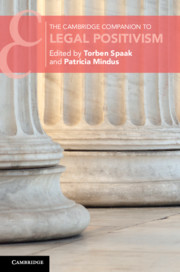Book contents
- The Cambridge Companion to Legal Positivism
- Cambridge Companions to Law
- The Cambridge Companion to Legal Positivism
- Copyright page
- Contents
- Figures
- Contributors
- Acknowledgements
- 1 Introduction
- Part I Fundamentals
- Part II History
- Part III Central Figures
- Part IV Main Tenets
- Part V Normativity and Values
- Part VI Critique
- 27 Gustav Radbruch’s Critique of Legal Positivism
- 28 Good Order and Workable Arrangements: Lon Fuller’s Critique of Legal Positivism
- 29 Dworkin’s Critique of Hart’s Positivism
- 30 Tracing Finnis’s Criticism of Hart’s Internal Point of View: Instability and the ‘Point’ of Human Action in Law
- 31 Alexy’s Critique of Legal Positivism
- 32 Mark Greenberg on Legal Positivism
- 33 Positivism and Totalitarianism
- Index
- References
32 - Mark Greenberg on Legal Positivism
from Part VI - Critique
Published online by Cambridge University Press: 21 January 2021
- The Cambridge Companion to Legal Positivism
- Cambridge Companions to Law
- The Cambridge Companion to Legal Positivism
- Copyright page
- Contents
- Figures
- Contributors
- Acknowledgements
- 1 Introduction
- Part I Fundamentals
- Part II History
- Part III Central Figures
- Part IV Main Tenets
- Part V Normativity and Values
- Part VI Critique
- 27 Gustav Radbruch’s Critique of Legal Positivism
- 28 Good Order and Workable Arrangements: Lon Fuller’s Critique of Legal Positivism
- 29 Dworkin’s Critique of Hart’s Positivism
- 30 Tracing Finnis’s Criticism of Hart’s Internal Point of View: Instability and the ‘Point’ of Human Action in Law
- 31 Alexy’s Critique of Legal Positivism
- 32 Mark Greenberg on Legal Positivism
- 33 Positivism and Totalitarianism
- Index
- References
Summary
Baum Levenbook explores another criticism made against legal positivism. As she explains, Mark Greenberg objects to legal positivism, first, that it is a mistake to hold that legal facts are determined solely by social facts and, second, that the content of authoritative pronouncements, such as statutes, is determined by their linguistic content. But, she points out, Greenberg’s first objection is premised on the mistaken assumption that the nature of law requires the connection between legal facts and the determinants of legal facts to be, as Greenberg puts it, ‘rationally intelligible’, and the second objection is based on the equally unwarranted assumption that it is part of the nature of law to operate in such a way as to ensure that legal obligations are genuinely binding.
- Type
- Chapter
- Information
- The Cambridge Companion to Legal Positivism , pp. 742 - 763Publisher: Cambridge University PressPrint publication year: 2021

